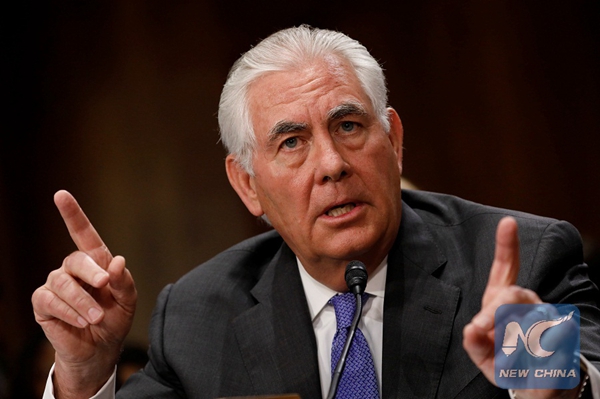Tillerson's realpolitik and grand bargain in Asia
- By Sumantra Maitra
 0 Comment(s)
0 Comment(s) Print
Print E-mail China.org.cn, August 11, 2017
E-mail China.org.cn, August 11, 2017
|
|
|
Rex Tillerson [Xinhua] |
Rex Tillerson is not much loved in Washington D.C. In a city known for career diplomats, academics and careerist politicians, Tillerson comes from a truly different background.
Formerly from a business background, he has often highlighted the need for different thinking in regard to policies proven to be persistent failures. Since taking office, for example, he has discarded millions of dollars of funding sanctioned by Congress for “counter-propaganda” purposes.
As academics and journalists have long pointed out, there's scant evidence that the funding used for “counter-propaganda” dissuaded a single individual from joining ISIS or changed a single mind regarding Russia. Nonetheless, Tillerson was skewered by the professional classes on Twitter for his action.
Similarly, in an early speech, he stressed a desire to focus on fundamental diplomacy and statecraft based on interests, without too much focus on values. He's since showed signs of practicing what he preaches.
Consider his statement on North Korea. Tillerson said Washington was seeking to persuade North Korea to give up its missile and nuclear weapons programs without any resort to force. The United States, according to him, does not seek “regime change, the collapse of the regime, an accelerated reunification of the peninsula or an excuse to send the U.S. military into North Korea.”
This is now known as the “four No's,” indicating a major step in the reduction of tensions on the Korean peninsula. It seems the United States and other major powers now understand that the North Korean rush to become a nuclear power stems from the extreme insecurity of seeing other regime change operations and interventions, most notably in Iraq and Libya.
Naturally the urge to have a deterrent against such intervention seemed to be very rational. Therefore, analysts are swinging towards a conclusion that the regime is acting rationally, and not irrationally, as previously thought.
In that light, Tillerson's statement is a welcome change aiming to reduce tensions in the region and give reassurances that a military solution is off the table.
Naturally that has it found a welcome in Asia. Chinese Foreign Minister Wang Yi said China "attached great importance" to Tillerson's remarks, as it had always attached importance to talking rather than fighting. A Global Times op-ed was quoted by Reuters as stating: “Many Americans would think Tillerson is showing weakness, but we see his statement as the most courageous expression from Washington regarding the Korean peninsula issue.”
This is an important point, and needs to be carefully noted. There are several ideological sources of domestic opposition to Trump, evident from almost daily leaks. Career diplomats, foreign policy officials from previous regimes, ideological opponents to Russia and China who don't like grand bargains with other great powers, form an enormous resistance to Trump and Tillerson's agenda.
Old-fashioned state-to-state diplomacy is looked down upon in this age of liberal institutionalism. Naturally, there will be resistance to Tillerson's olive branch to North Korea, and China as well. It is, therefore, very important for policymakers to carefully learn to recognize what is a genuine signal coming from the American administration, and what is a leak aimed to sabotage a grand bargain.
The thing is, a grand bargain in Asia is the only way forward. With the economic growth of China, and the relative decline of U.S., there are only two rational ways forward for the two superpowers. One is a policy of containment, arms race and trade wars, which will result in a security dilemma and further antagonism and rivalry over Asia.
The other is accommodation, somewhat like the peaceful coexistence with Khrushchev. While there will always be differences in interests between China and United States, there is also a huge area where their interests align. North Korea is one such area, and Islamic terrorism is another.
The rules of grand bargain are give and take -- a transactional approach to foreign policy -- and to discard the approach of seeking primacy. If China and United States can figure out what they can live without and what they are willing to sacrifice, and offer as a bargain, it would be much easier to achieve relative long-lasting peace and stability in the Asia Pacific region.
Sumantra Maitra is a columnist with China.org.cn. For more information please visit:
http://www.ccgp-fushun.com/opinion/SumantraMaitra.htm
Opinion articles reflect the views of their authors only, not necessarily those of China.org.cn.






